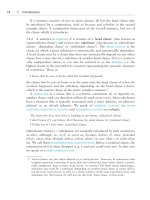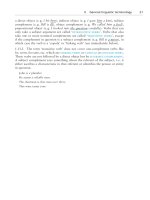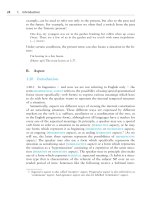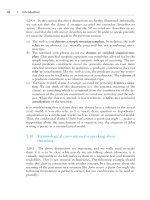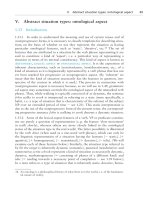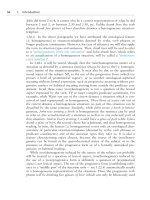The grammar of the english verb phrase part 116 pptx
Bạn đang xem bản rút gọn của tài liệu. Xem và tải ngay bản đầy đủ của tài liệu tại đây (79.37 KB, 7 trang )
798 Glossary
would do it tomorrow, but that is irrelevant to the definition of ‘past temporal
domain’. A domain is a past domain if and only if its central orientation time
is located in the past time-sphere.
Past tense (or preterite): (a) The tense realized in such tense forms as ran,
walked, was, etc. In this work we distinguish between the absolute past tense
(or ‘absolute preterite’), which locates a situation time in the past time-sphere
and in doing so establishes a past domain, and the relative past tense (or ‘rela-
tive preterite’), which expresses T-simultaneity in a past domain. (For example,
in John said he was feeling tired, said is an absolute past tense form and was
feeling is a relative past tense form.); (b) Both ‘past tense’ and ‘preterite’ are
sometimes used (sloppily) in the sense of ‘past tense form’ (as in The preterite
‘left’ in ‘John left early’ is an absolute preterite.); (c) The plural form past
tenses (but not *preterites) is sometimes used as an abbreviation of ‘past time-
sphere tenses’ (i. e. the four tenses used to locate a situation time in a past
domain, viz. the preterite, the past perfect, the conditional tense and the condi-
tional perfect).
Past time-sphere: time-sphere conceptualized as a time span of indefinite length
which lies wholly before the temporal zero-point (t
0
) and is disconnected
from t
0
.
Past time-sphere tense: cover term for any of the four tenses which typically
represent a situation time as forming part of a temporal domain that is estab-
lished in the past time-sphere: the past tense (or preterite), the past perfect, the
conditional tense (realized as ‘would ϩ infinitive’) and the conditional perfect
(realized as ‘would have ϩ past participle’). These tenses all involve a past
tense inflectional morpheme.
Past time-zone: see past zone.
Past zone (or past time-zone): alternative term for ‘past time-sphere’. (The
terms zone and time-sphere are equivalent where the past is concerned, but not
where the present time-sphere is concerned, which involves three time-zones,
viz. the pre-present, the present and the post-present.)
Past-zone adverbial: single-zone time-specifying adverbial which specifies a
time in the past zone. Such an adverbial can combine with the past tense but
not with the present perfect. For example: The doctor {came / *has come} yes-
terday.
Perfect: shorthand for present perfect, present perfect tense form or perfect
tense. The use of the term in any of these senses is avoided in this work: the
full terms are used instead.
Perfect auxiliary: see perfect tense auxiliary.
Glossary 799
Perfect gerund: nonfinite verb form which is made up of the present gerund
form having followed by a past participle form and which has a nominal syn-
tactic function, e.g. having made in I admit (to) having made a mistake.The
perfect gerund, though nontensed in our account, expresses anteriority to the
time of the head clause situation.
Perfect infinitive: nonfinite verb form made up of the present infinitive form
have followed by a past participle form, e. g. have eaten, have been eaten.The
perfect infinitive, though nontensed in our account, expresses anteriority to the
time of the head clause situation.
Perfect of experience (or experiential perfect): (in this work), a particular usage
type (ϭ a functional reading) of the indefinite perfect, namely one which refers
to the actualization of one or more W-bygone situations which are not neces-
sarily recent but which are ‘carried along’ as part of one’s experience and
knowledge. For example: Have you ever been to Casablanca?.
Perfect tense auxiliary: the grammatical auxiliary have, which combines with
a past participle to form a perfect tense form.
Perfect tenses: cover term for any of the four tenses whose tense forms involve
the perfect tense auxiliary have: the present perfect (e. g. I have done it), the
past perfect (e. g. I had done it), the future perfect (e. g. I will have done it)
and the conditional perfect (e. g. I would have done it).
Perfective aspect: kind of grammatical aspect: the speaker’s choice of verb form
(which is necessarily nonprogressive) reflects his wish to refer to (the actualiza-
tion of) a situation in its entirety. There is no specific reference to any of the
portions (beginning, middle or end) of the actualizing situation.
Perfective meaning: the idea that the verb form refers to the actualization of a
situation in its entirety. For example, unlike John was drawing a circle, which
expresses imperfective (more particularly progressive) meaning, John drew a
circle expresses perfective meaning.
Performative speech act: speech act that is performed by the very uttering of a
sentence. For example, by uttering the sentence I wish you a merry Christmas,
the speaker actually performs the act of wishing the hearer a merry Christmas.
Periphrastic auxiliary: the grammatical auxiliary do, which is used for do-
support, i. e. which is inserted into a verb phrase that does not contain an
auxiliary when that verb phrase is to be used in a construction that requires
an auxiliary (e. g. “I don’t love her. Do you love her?” Ϫ “ YesIdo;Ido
love her.”).
Permanent habit: habit that is not represented as being restricted in time. For
example: I don’t drive to work. I take the bus or walk.
800 Glossary
Phrase: syntactic unit consisting of a word functioning as a ‘head’ or ‘nucleus’-
potentially accompanied by one or more other words or word groups clustering
around the head. The nature of the phrase is determined by the word class of
the head. Thus, in the sentence Most people in their thirties need money,we
have a five-word noun phrase (NP) most people in their thirties (with people
as head), a three-word prepositional phrase in their thirties, a two-word verb
phrase (VP) need money, and a one-word noun phrase money.
Pluperfect: see past perfect tense.
Point of view: term introduced in the discussion of temporal focus, to capture
the observation that, by making a marked tense choice, a speaker may repre-
sent the actualization of a situation from someone else’s viewpoint, e. g. from
the temporal standpoint of a character in a past-tense narrative. For example,
They climbed the Matterhorn, which was very steep differs from They climbed
the Matterhorn, which is very steep in that by using the past tense the speaker
assumes the point of view of the climbers: was makes it clear that it was they
who experienced then and there that the Matterhorn is steep. In other words,
while is triggers a transparent reading (i. e. reveals the speaker’s point of view
at t
0
), was triggers an intensional (opaque) reading.
Polar question (or
yes/no
-question or wide scope question): interrogative
sentence or subclause expressing a question to which the expected reply is yes
or no. The clause does not contain a question word, and the question has scope
over the entire proposition. For example: Is the house humid? (ϭ ‘Is it the case
that the house is humid?’)
Positive polarity item: see assertive item.
Possible world: way that things are or might be. The actual world is the way
things actually are at speech time. A nonfactual world is an alternative way of
conceptualizing things, such as a future world, the hypothetical world of the
imagination of the speaker, a counterfactual world, etc. Thus, Paris is the capi-
tal of France is true in the actual world, whereas the proposition ‘Paris be the
capital of Italy’ in If Paris had been the capital of Italy [the Pope would have
been living there] is true in a counterfactual world. Similarly, the proposition
‘You be married’ expressed in I thought you were married! is true in the speak-
er’s past world of thinking but assumed (by implicature) to be counterfactual
in the actual world.
Posterior: following in time: time A is posterior to B if it follows B. See also
T-posterior and W-posterior.
Posteriority: type of temporal relation. A given time A is posterior to a given
time B if A follows B in time. Posteriority is W-posteriority if A is interpreted
Glossary 801
as posterior to B in the possible world referred to. Posteriority is T-posteriority
if it is a relation that not only exists in interpretation but is formally expressed
by the tense form of the clause. Thus, in John said he would do it the next
day the situation time of would do is represented as T-posterior to (ϭ follow-
ing) the situation time of said.
Post-present: (a) shorthand for post-present zone; (b) can also be used as an
adjective modifying the noun situation, this combination then being short for
‘situation whose situation time is located in the post-present time-zone’. (Simi-
larly, when we speak of the post-present actualization of a situation, we mean
its actualization in the post-present zone.)
Post-present domain: temporal domain whose central orientation time lies in
the post-present zone. Such a domain can be established directly by the use of
the future tense or by a futurish tense form (e. g. He’s going to leave; I’m
leaving tonight). It may also be established indirectly by expressions implying
future time reference, such as imperatives or certain verbs whose lexical mean-
ing implies posterior actualization of the situation referred to in its complement
clause, like expect [to V] or intend [to V].
Post-present time-zone: see post-present zone.
Post-present zone (or post-present time-zone): portion of the present time-
sphere that is conceptualized as following the temporal zero-point (t
0
). For
example, I will leave and I’m going to leave both locate the time of the actual-
ization of the situation of ‘my leaving’ in the post-present zone.
Potential full situation: In clauses using one of the perfect tenses and receiving
a continuative reading, this term refers to the factual full situation plus that
part of the full situation that may potentially continue beyond the relevant
orientation time (which in the case of the present perfect is the temporal zero-
point). Thus, in Meg has been talking to the elephant for an hour now, the
potential full situation is longer than an hour (since one hour is the adverbially
specified length of the factual full situation).
Predicate: (a) syntactically: shorthand for predicate constituent; (b) semanti-
cally: what is said (or asked) about the referent of the subject of a clause.
Predicate constituent: the syntactic unit functioning as predicate within a
clause. It is made up of all the elements of a clause except the subject, in other
words, of the verb phrase and of additional optional phrases, if any.
Predicated situation: that part of the full situation (possibly all of it) about
which an assertion is made (or a question is asked) in a tensed clause. In other
words, the predicated situation is that part of the full situation (possibly all of
it) that is located in time by a tense form. In Five minutes ago John was in the
802 Glossary
kitchen the predicated situation is that part of the situation that is represented
as contained in (which here means: temporally coinciding with) the punctual
Adv-time indicated by five minutes ago. The full (ϭ complete) situation may
take up a much longer period (which may include the temporal zero-point),
but the sentence does not tell us anything about this. It just makes a claim
about (i. e. predicates something of) that part of the (actualization of the) situa-
tion that coincides with the time indicated by five minutes ago.
Predicational sentence: any sentence that is not a specificational sentence; in
other words, a predicational sentence merely says (or asks) something about
the referent of the constituent functioning as topic (theme) of the sentence. An
example of this is John has already read this book, provided there is no con-
trastive (ϭ extra heavy) accent on one of the constituents. (A contrastive accent
always entails a specificational reading:
John
has already read this book means
‘It is John who has already read this book’.)
Predictability: the expression, by means of the future tense (with will as auxil-
iary), of the probability of the truth of a conclusion about a present situation,
e. g. That will be the milkman, when interpreted as ‘It is predictable that that
is the milkman’.
Prediction: the expression of an assumption that a situation will actualize in
the post-present (or, in the case of would, at a time posterior to the time of
making the prediction), e. g. John will be there, when interpreted as ‘It is my
opinion that John will be there’ (rather than as ‘It is predictable that John is
there’ – see predictability).
Preparatory phase reading: interpretation produced by the use of a progressive
form of a verb denoting a transitional situation (like dying). Because a pro-
gressive form only refers to the middle part of a durative situation, He was
dying (as opposed to He died) is interpreted as only referring to the phase
leading up to the transition (from life to death); in other words, He was dying
does not state that he died but only refers to the durative process which was
interpreted as leading up to his death: the sentence refers to the ‘preparatory
phase’ only, not to the actual transition (which may even be denied, as in He
was dying [when we found him, but he pulled through in hospital.]).
Pre-present: (a) shorthand for pre-present zone; (b) can also be used as an
adjective modifying the noun situation, this combination then being short for
‘situation whose situation time is located in the pre-present zone’. (Similarly,
when we speak of the pre-present actualization of a situation, we mean its
actualization in the pre-present zone.)
Pre-present domain: temporal domain that is established by a present perfect
tense form which locates its situation time in the pre-present zone of the present
Glossary 803
time-sphere. This situation time functions as the central orientation time of the
pre-present domain that is established.
Pre-present time-zone: see pre-present zone.
Pre-present zone (or pre-present time-zone): portion of the present time-sphere
that is conceptualized as leading up to the temporal zero-point (t
0
) and whose
endpoint is conceived of as adjacent to t
0
. (In other words, the pre-present zone
is conceptualized as leading up to t
0
without including t
0
.) To locate a situation
time in the pre-present English uses the present perfect tense.
Pre-present-zone adverbial: single-zone time-specifying adverbial which speci-
fies a pre-present zone, e. g. from the beginning of May until now; over the
past four years; so far; etc.
Present: (a) (as a noun) shorthand for present zone; occasionally also shorthand
for ‘present tense’, when there can be no confusion, as in the combination
‘(non)progressive present’; (b) (as an adjective) ‘located in the present’, e. g. a
present situation is a situation whose situation time is located in the present
zone; ‘present relevance’ refers to the fact that the pre-present actualization of
a situation is still relevant at the temporal zero-point.
Present continuous: progressive form of the present tense. (synonym of pro-
gressive present)
Present domain: temporal domain established by a present tense form which
locates a situation time in the present zone (i. e. represents the situation time
as coinciding with the temporal zero-point).
Present gerund: nonfinite verb form involving the suffix -ing (e. g. walking,
being hit, swimming) and forming part of a nominal clause, e. g. walking in
the dark in I don’t like walking in the dark. A present gerund differs from a
perfect gerund in that it does not involve the -ing form of the perfect tense
auxiliary have.
Present infinitive: nonfinite verb form as it appears as an entry in a dictionary
(e. g. eat, which is also the stem of the verb); also, the passive counterpart of
the dictionary form (e. g. be eaten). The present infinitive is nontensed but is
interpreted in terms of a single temporal relation, which is usually that of
simultaneity with the time of the head clause situation, but occasionally a
relation of posteriority: in I hope to see her tomorrow, the time of the situation
referred to by the infinitive clause is interpreted as posterior to the time of the
head clause situation.
Present participle: nonfinite (and therefore nontensed) verb form consisting of
the stem of the verb plus the suffix -ing and which can either have an adjectival
804 Glossary
function or form part of a progressive verb form, e. g. the form causing in The
hotel guests causing a disturbance {last night / at the moment / tonight} will
be arrested tomorrow. As this example shows, the time of the situation referred
to by a participial clause with a present participle can (according to the
context) be interpreted as anterior, simultaneous or posterior to the time of the
head clause situation.
Present perfect: tense which is formed by combining a present tense form of
the auxiliary have with the past participle of the main verb. The semantics of
this tense is: ‘The situation time is located (i. e. ‘contained’) in the pre-present
zone’. Since ‘containment’ means either proper inclusion or strict coincidence,
there are two T-interpretations that are in keeping with this core meaning: a
‘before now’ reading (‘The situation time lies wholly before t
0
’) and a ‘co-
extensive’ reading (‘The situation time leads up to now and therefore coincides
with the pre-present zone’).
Present subjunctive: type of mood. In English, the present subjunctive form is
homonymous and homophonous with the present infinitive (e. g. if the truth
be told…;[It is vital that] she see her physician for treatment).
Present tense: tense which is formed by using the stem of the verb, except for
third person singular subjects, which require the verb form to take an added
-(e)s ending. (There are some well-known exceptions, notably the verb be, the
verb have and the auxiliaries.) When used as an absolute tense, the most basic
meaning of the present tense is that the situation time coincides with the tempo-
ral zero-point. When used as a relative tense (as in [I will be happy] if she
comes), it represents the situation time as T-simultaneous with a post-present
situation time which is treated as a pseudo-present time.
Present time-sphere (or nonpast time-sphere): time-sphere conceptualized as a
time span of indefinite length containing the present zone, which coincides
with the temporal zero-point (t
0
), the pre-present zone, which leads up to t
0
,
and the post-present zone, which begins immediately after t
0
.
Present time-sphere tense: cover term for the four tenses which typically locate
a situation time in the present time-sphere: the present tense (as absolute tense),
the present perfect, the future tense and the future perfect. These tenses all
involve a present tense inflectional morpheme.
Present time-zone: see present zone.
Present zone (or present time-zone): portion of the present time-sphere that
coincides with the temporal zero-point. Since t
0
is conceived of as punctual, so
is the present zone.
Presuppose: ‘presuppose something’ means ‘treat something as being a presup-
position (of a certain linguistic expression)’. For example, in It was John who



